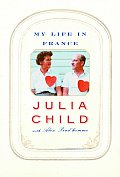 I finished this book last week, and I’ve been trying to find the time to write a little review of it, but I keep getting pulled away by other things.
I finished this book last week, and I’ve been trying to find the time to write a little review of it, but I keep getting pulled away by other things.I remember The French Chef being on the television when I was a very little girl (it came on either just after or right before the shows that interested me: Sesame Street, The Electric Company, and Zoom), but I never watched it when I got older. To me, French cooking was too much of a complicated affair (still is), and it involves the handling of way too many animals. I am not a vegetarian, but I don’t eat a lot of meat, and when I do it must be boneless and skinless (no preservatives, no antibiotics, etc.) and in no way recognizable as an animal of any sort. One Christmas I made chicken tetrazzini for my family, following a recipe that called for me to boil a whole chicken. Of course, you can’t just slide the thing out of a wrapper and into a pot of water. You have to reach in and take out the bag of stuff, of parts, and then wash the…uh, body. Carcass. Ew. *Shudder*
It took me about an hour to get the chicken out of the wrapper and into the pot. Handling a chicken while wearing rubber gloves—the old-fashioned, yellow, rubber kind that you wear while washing dishes—isn’t exactly a piece of cake. Chickens are slippery, and then when you factor in the drinking (I had a glass of wine to calm my nerves) and the fact that I had to keep putting the chicken down (“Bad chicken! Terrible chicken! You suck!”) so I could go in the living room and collect myself, well, you can see where I might have struggled.
Old Julia, though, is afraid of nothing. I jest, but cooking isn’t easy, and I think to prepare French cuisine in particular, one has to be pretty fearless. She was 37 when she moved to France along with her husband, Paul Child, and learned to cook. Many of the animals she handles still have things like feathers and heads and fur.
Wait. I’m going about this all wrong. Because really My Life in France is not about cooking at all, but about a person who found her calling, and all the attendant passion that follows. So many of us have half-assed jobs, where we like a part but not all of it, and we sit in our offices or cubicles and wish we were doing something else. Julia Child simply fell into cooking—before France, she basically had no interest in it at all, but she loved food, and she fell in love with France, so things fell into place. What I found remarkable about her story, besides the fact that the book is in her “voice” and so friendly and compelling, is how she never considered anything an obstacle.
While her wonderful stories, her curiosity, and her joie de vivre don’t exactly make me want to, oh, say, pluck a chicken and stuff herbs under its skin, she does inspire me to stay open to experience, to keep my chin up and my eyes open. So many memoirs are “poor little me” stories, this book is refreshing for all its happiness and plucky (pardon the pun) go-get-'em attitude. I’ve already recommended it to several people at work, and I’m thinking of recommending of for my real-life book club. And now I’m recommending it to you…but vegetarians, beware. On the one hand, in post-war France, she’s dealing with animals fresh off the farm, so at least there’s no corporate cruelty. But on the other hand, she does go into great detail about cooking different animals, and her approach is very French—pragmatic. If you are easily upset by that sort of thing, then you might want to stay away.
Bon appetit!
*photo from powells.com